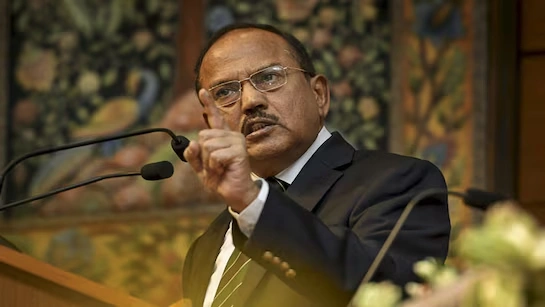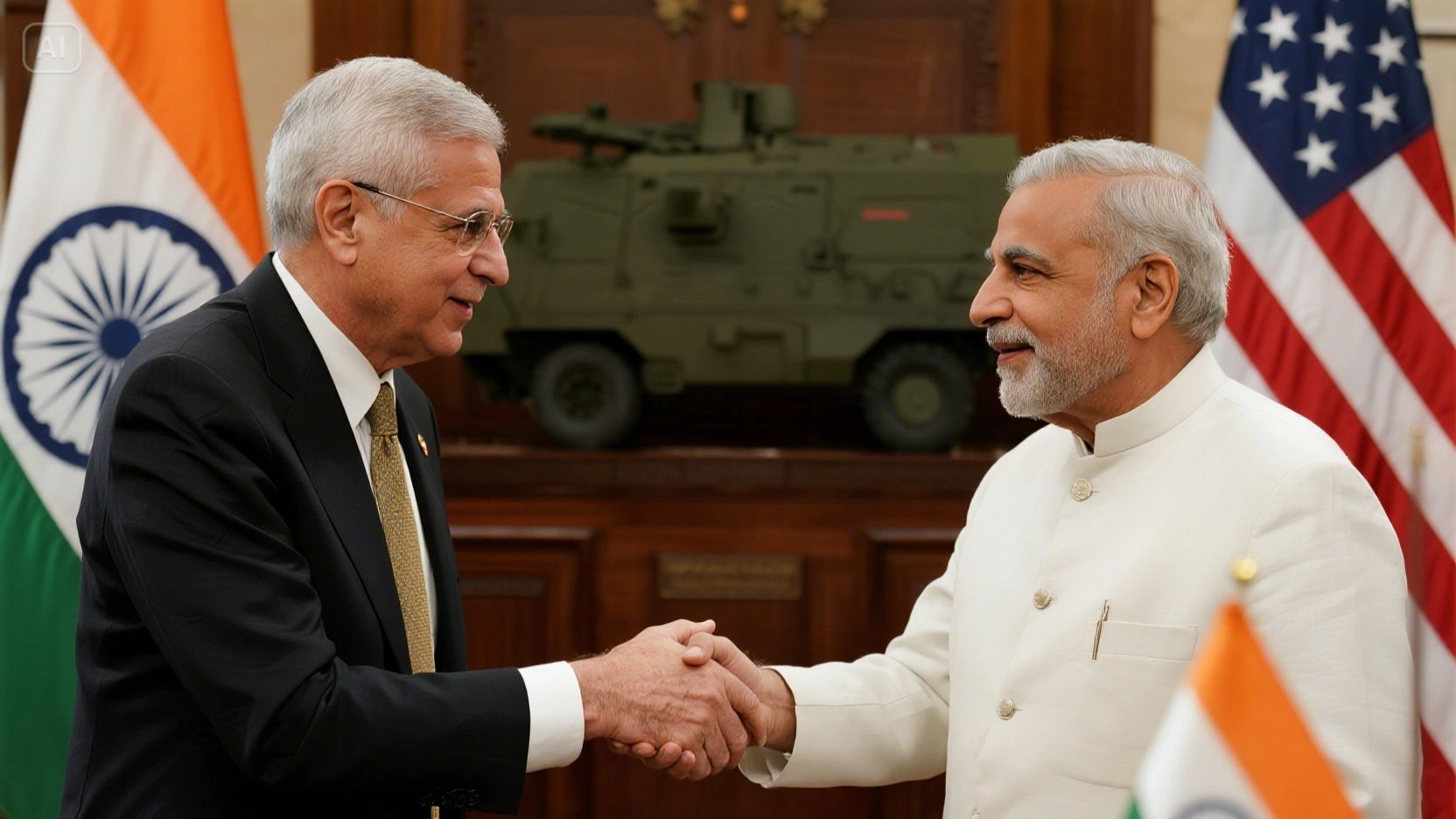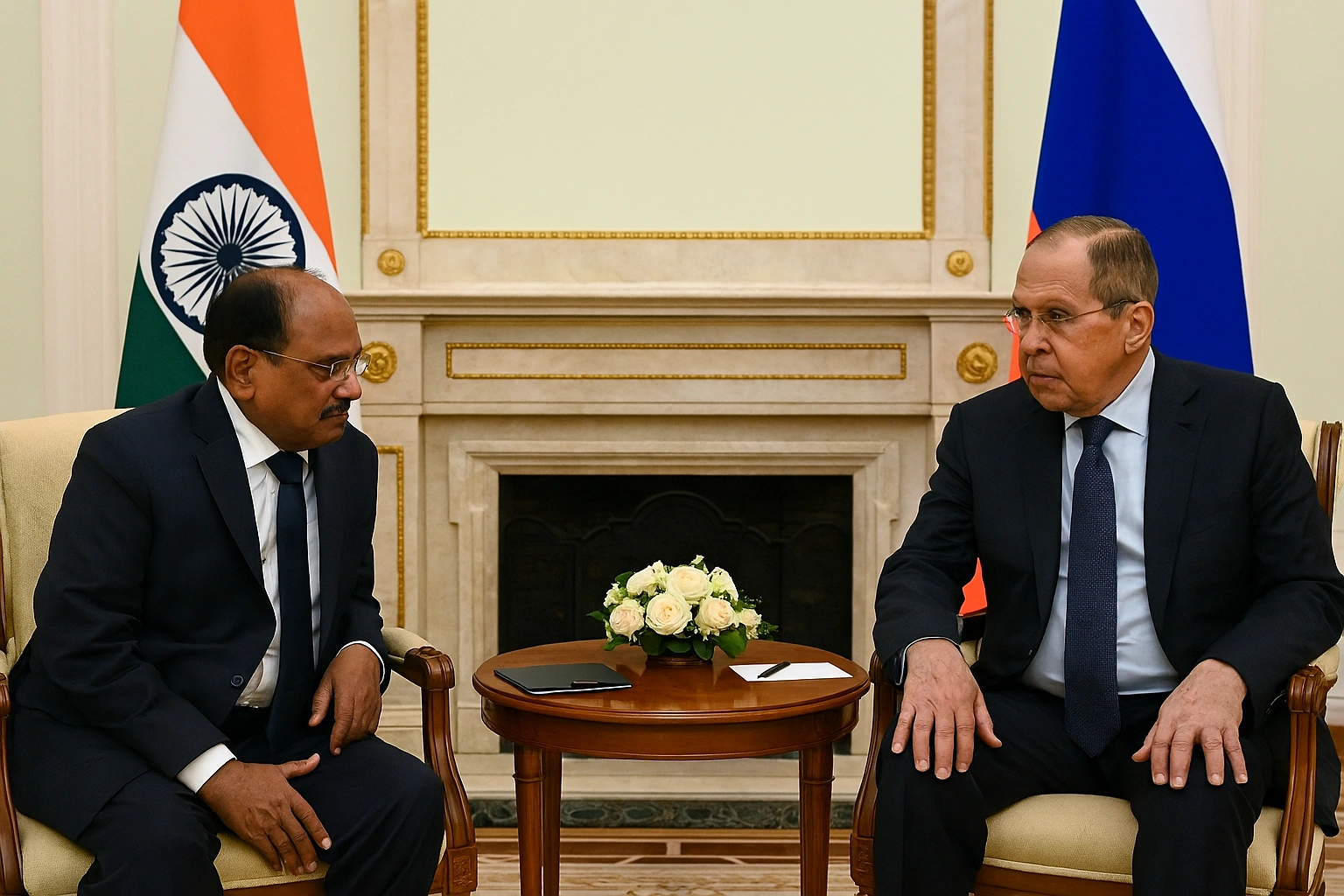Navigating US Trade Tensions and Regional Realignments
India’s National Security consultant Ajit Doval’s recent tour to Moscow to strengthen defence and strategic connections with Russia, amid escalating trade tensions between the United States (US) and India, signifies New Delhi’s aware exertion to broaden its international unions. This act, which draws criticism and analysis from the US, is a planned calculation by India to reinforce its independence in geopolitics and security. In addition to upending the existing balance of international diplomacy, this shift to Moscow in the face of growing US tensions also highlights India’s weaknesses and may give regional rivals the confidence to step in to strengthen their own diplomatic bonds.

Escalating US-India Trade Tensions and Their Global Impact
The imposition of high US importation taxes on Indian imports, especially 25% charges, which were linked to India’s continued buying of Russian oil and military hardware, has caused a substantial decline in the US-India trade affiliation in 2025. The purpose of these taxes is to penalize India for continuing to have relations with Moscow in spite of Western authorizations against Russia in the wake of the conflict in Ukraine. The trade clash has weakened India’s cost attractiveness and forced businesses to look for new markets or redirect exports by upsetting important Indian export industries like electronics, textiles, gems and jewellery, and pharmaceuticals. Also, supply chain pressures force US multinational firms doing business in India to re-examine their manufacturing and investment plans.
Moscow Visit of Ajit Doval’s: Strategic Significance Amid Rising Pressure
National Security Advisor of India, Ajit Doval, reached Moscow to strengthen defence and security cooperation with Russia. The visit was well planned, but the trade consequences with the US made it even more important. The topics of conversation included energy security, counterterrorism, defence procurement, and regional stability, particularly India’s imports of Russian oil, which continue to be a point of disagreement for Washington. Doval’s trip validated India’s willpower to maintain its strategic independence and sent a message that it will resist outside pressure to detach ties with Moscow.
India highlighted the so-called double standards by Western countries that preserve strong trade with Russia, mounting its oil imports as crucial for national wellbeing and market firmness despite US warnings and tariff threats.
Highlighting an obligation to supporting bilateral ties away from purely economic goals, the visit also set the stage for future high-level exchanges, including an expected visit by India’s foreign minister to Russia.

Implications for India’s Strategic Independence and Regional Dynamics
A swing of India towards Russia is the outcome of a careful balancing act between stabilizing strategic independence and handling escalating hostilities with the US. India appreciates its treaties with the US, especially in the context of democratic collaboration frameworks like the Quadrilateral Security Dialogue (Quad) and Indo-Pacific initiatives. However, the trade dispute exposes deeper fault lines over energy policy and defence sourcing that are intertwined with the larger geopolitical competition between China and Russia. The complications of this realignment extend beyond the relationship between Washington and New Delhi. India’s self-governing position challenges Western-led descriptions on sanction implementation and geopolitical configuration, signalling a challenge to the current global power structure. By taking advantage of India’s tense relations with the US, it delicately gives others a chance to improve diplomatic relations, which could make new stronger strategic alliances and promote a more multipolar regional order.
The Geopolitical Blunder: Undermining Global Balance and Exposing Vulnerabilities
According to some experts and observers, India’s pivot to Moscow reveals a strategic mistake, undermining the global balance, exposing Delhi’s fear, and opening space for multipolar alliances. According to this perception, India runs the risk of offending an important international supporter and deflating tries to maintain a unified liberal international order because of its emergent ties with Russia in the face of growing tensions with the US. Globally, this turn might be seen as India’s last-minute attempt to acquire security declarations at the expense of international diplomatic wealth.
India’s Defense and Energy Strategy: Continuity Amid Conflict
United States (US) leaders have pointed out that India continues to purchase a significant amount of defence equipment from Russia in spite of outside pressure. India’s dependence on Moscow’s defence technology is further underscored by the fact that it is now Russia’s one of the biggest customers of military hardware, just behind China. At the same time, Russian energy imports act as a planned safeguard against the instability of world energy markets. India has prioritized real-world needs over geopolitical signalling, as evidenced by Ajit Doval’s discussions, which specifically included efforts to guarantee consistent oil supplies and ongoing defence cooperation.
This two-pronged strategy illustrates India’s all-embracing policy, which is to differentiate alliances without cutting off the historical significant connections.
“How can India adopt a balanced and dignified diplomatic approach to maintain stable relations with both Moscow and Washington, while securing its economic and security interests through diversified international partnerships and active participation in regional forums?
Despite the complex dynamics, India should adopt a dignified approach that have aimed to maintain balance in its relations with both Moscow and Washington without escalating hostilities. Trust could be maintained and tariff effects should be lessened through diplomacy focused on vulnerable communication with the US on the defence and energy issues. India can secure its economic and security interests in a multipolar world by increasing its international partnerships across Asia, Europe, and elsewhere at the same time, reducing its over-reliance on any one of the partners. It is probable to equalize dints of distraction or strategic miscalculation by regularly participating in the regional forums and reaffirming commitments to the rule based order. To regulate these narratives and to prevent diplomatic isolation or also intensified rivalry, India’s leadership must carefully explain to audiences around the world why it supports those diverse alliances.
India anticipates strengthening the strategic autonomy through closer defence and energy ties with Russia, as evidenced by Ajit Doval’s visit to Moscow, amid rising US India trade tensions. But this change of direction amid escalating diplomatic tensions represents the unsafe balancing act. It challenges the global power alignments and creates opportunities for the regional rivals like Pakistan to take benefit of India’s diplomatic weaknesses, even as it repeats India’s promise to a self governing foreign policy. To manage the partnerships, preserve India’s international reputation, and also to maintain regional stability in a fractured global order, navigating these tensions calls for strategic patience and astute diplomacy.
Disclaimer: The views and opinions expressed in this article are exclusively those of the author and do not reflect the official stance, policies, or perspectives of the Platform.







